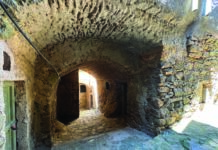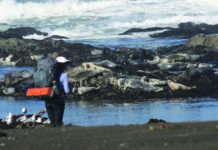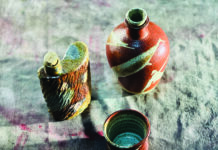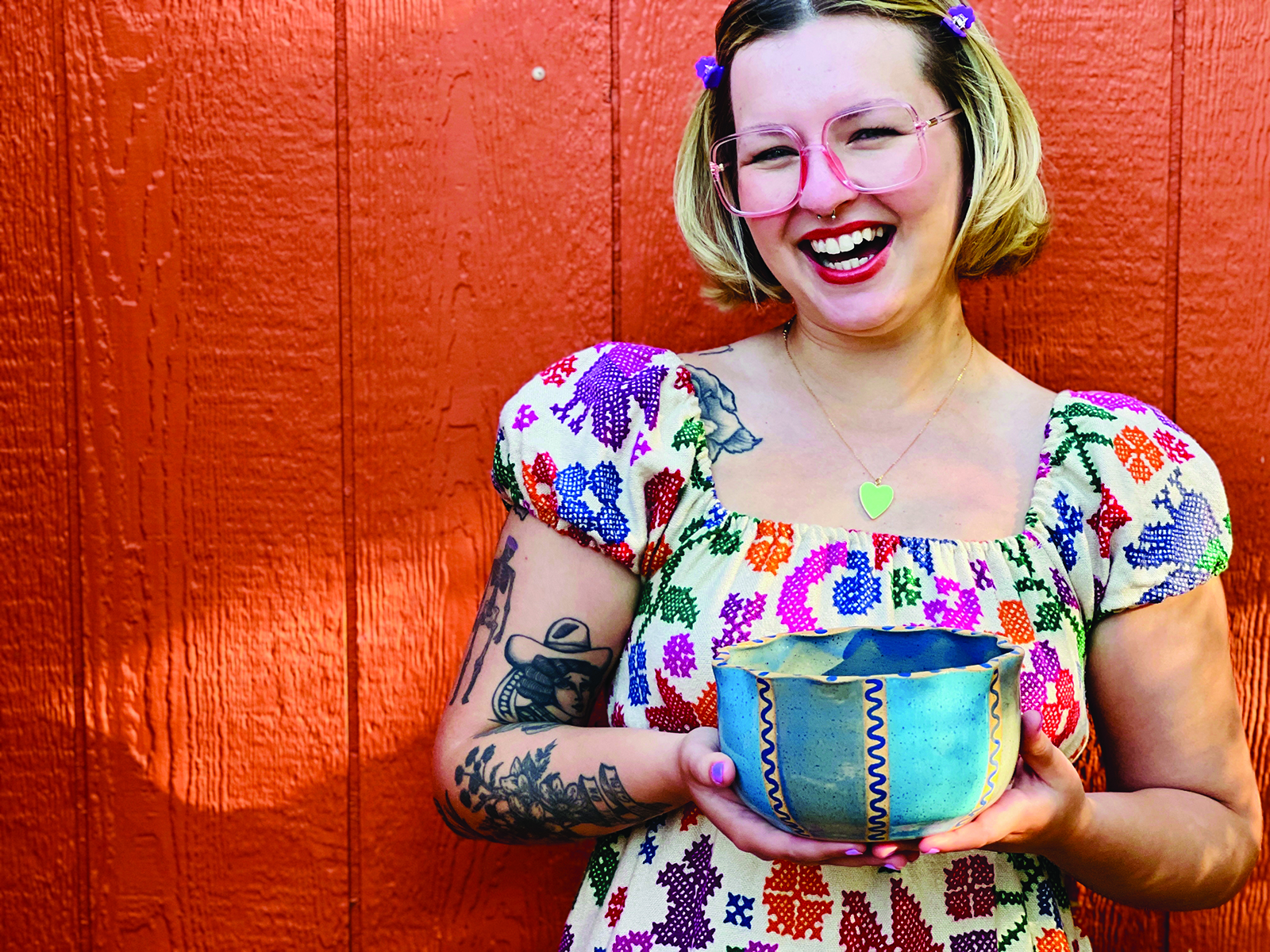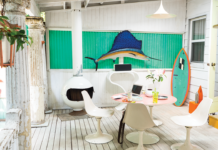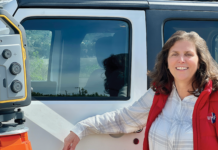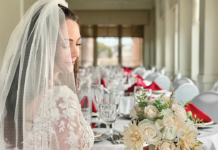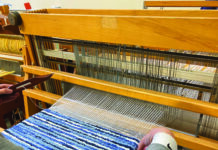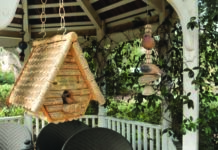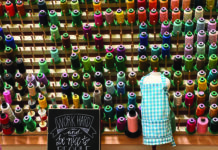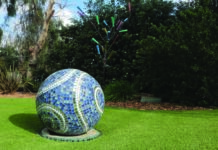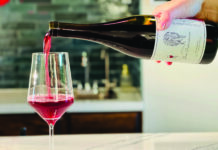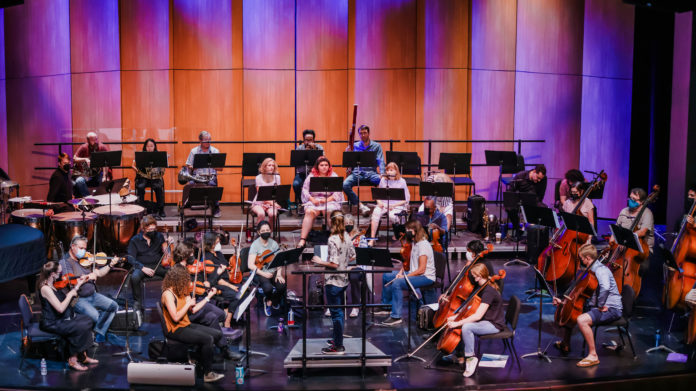The Miriam and Henry Schwab Music Academy at Ventura College returns with a crescendo.
By Mike Nelson
Photos by Brandon King/Theotus Media
Tears on Monday. Cheers on Tuesday. Lessons, memories and more to treasure for a lifetime.
Such is the experience for those — students and teachers alike — who participate in the Miriam and Henry Schwab Music Academy at Ventura College, a learning opportunity designed to advance music education and promote stronger connections among the fine arts community.
Launched in 2019 with a $12 million donation from a local music lover who wanted to offer an affordable opportunity to those wishing to develop their musical gifts, the Schwab Music Academy last July hosted dozens of music students of all ages, who spent three weeks of their summer learning music, improving their musicianship, and embracing the collaborative experience.
“Music education teaches students more than just music,” says Ashley Walters, music director and conductor for the Schwab Academy. “It teaches students to develop a strong work ethic, how to work as a team player, how to communicate — verbally and non-verbally — through their instrument, how to make goals and how to meet them by organizing bigger goals into smaller tasks. Music provides students, of all ages, with an incredible community that can offer support and guidance as they discover and pursue their own dreams.”
Or, as Academy founder and director Robert Lawson says, “The students and faculty become a family — working together daily and developing their skills in music communication with their ensembles, as well as presenting the performance to the community. And all are amazed at how well they progress.”
Students from pre-teens to the Medicare-eligible feel exactly the same way.
“It’s an opportunity to push yourself and learn in a safe environment with teachers who have your best interests in mind,” says Sophia Holdorf, a 20-year-old Venturan and former winner of the Henry Schwab Violin and Viola Competition that is now part of the Academy program. “Yeah, you need to be prepared to work really hard; it’s not a walk in the park by any means. But it’s a non-competitive and open environment. We cheer each other on, we welcome each other’s experience, and we build connections that we’d never have any other way.”
This year marked the second summer session for the Schwab Music Academy, the first after a two-year coronavirus-mandated interruption, and, in the words of its participants, a success on every level. Just as its founding mother had hoped.
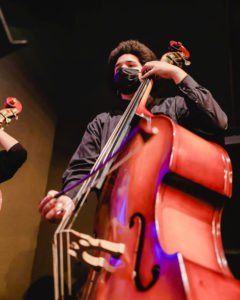
Genesis
Miriam Emily Schwab was a successful real estate entrepreneur and violin enthusiast who enjoyed playing with various ensembles, including the Ventura College Symphony. When her husband Henry — a concert violinist and teacher of international renown — died in 2006 at age 99, Miriam asked Lawson, as Ventura College Music Department chair, if she could create a violin competition at Ventura College in Henry’s memory.
“By that time,” says Lawson, “I had been reaching out to arts programs and donors for generous donations and endowments to the Ventura College Music Department, which led to the Helen Yunker Endowment in 2003. And when Miriam brought forth the idea of a competition, it just made sense.”
The Henry Schwab Violin/Viola Competition began in 2008, with annual $10,000 donations from his widow. It was open to young musicians up to the age of 25 in order to provide encouragement and financial assistance to fund their arts education. “Because of Miriam’s generosity,” says Lawson, “children who are aspiring virtuosos have a path to achieve their dreams.”
But Miriam Schwab’s music philanthropy had only begun. In 2012 she and Lawson — whose musical career includes many years developing and leading youth music programs — began regular conversations about creating an endowment gift to establish a year-round academy to support the instrumental music classes, and a three-week intensive summer program.
Those conversations took on new urgency in 2017, shortly before Miriam died on Dec. 24 at age 89. “Near the end of Miriam’s life, she and I had many conversations concerning her wishes for the endowment gift,” recalls Lawson. “She wanted to see chamber music and orchestra classes that were affordable for everyone, and the continuation of the Henry Schwab Violin/Viola Competition. The Miriam and Henry Schwab Academy of Music is the visionary conception that is now the reality.”
Lawson and the Ventura College Foundation worked more than a year with Schwab’s estate lawyer to establish Miriam’s gift to the college’s Music Department. Most of her $12 million endowment ($10.2 million) actually went to establishing the academy; the remaining $1.8 million went to the college’s aquatics program (no surprise, since Schwab was also an active swimmer and hiker who put in many laps at the Ventura College pool).
“The academy’s three weeks of performances aspires to honor her wonderful generosity and love of classical genre that she consistently lobbied for as a committed supporter of the instrumental program at Ventura College,” says Lawson. “Her gift will continue to develop the academy each year for generations to come.”
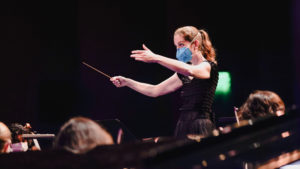
A solid beginning
The academy’s first summer, in July 2019, began with Lawson as music director and conductor, 85 students and 15 academy faculty, with three-hour classes each day (in chamber music) and night (in orchestral music), plus rehearsals and performances on Saturdays and Sundays. The students who attended classes in their respective instrumental specialties (strings, woodwinds, brass, keyboards, classical guitar and percussion) found the experience intense, yet exhilarating.
“I love playing violin, especially for hours on end, so I really enjoyed the high intensity of practicing within the three weeks of the academy,” says Laura Liang of Ventura, who was 15 and attending Foothill Technology High School when she participated in that first academy. “The community I was in provided a space that fostered creativity, musicality and fun. I’d end those days with my shoulders and back sore, but it was worth it knowing I wasn’t alone. This physical fatigue was a tradeoff for the euphoric emotional energy I fed into the music.”
The faculty, many of whom regularly teach at Ventura College, came away feeling the same.
“I thought the students handled the challenges really well,” says Nick Akdag, bassoon instructor. “Obviously there was a learning period, but if you give people hard music and expect them to do well, they will do it well; expect great things and they rise to occasion. There was no babying or hand-holding, and they really rose to the challenge.”
John Hester, string bass instructor and event coordinator for the academy, cites the importance of offering encouragement as well as challenge.
“My fellow teachers and I have a huge advantage, because we have experienced the joy of creating beauty many times with other musicians that helps us encourage doubtful students,” he explains. “This motivates us in patiently helping, teaching and encouraging . . . A good metaphor, perhaps, is an experienced mountain guide who patiently helps hikers in the Sierra Nevada Mountains because the guide knows what beautiful vistas the hikers are about to experience, if they can just make it up that next hill.”
Interruption, and return
The momentum from that first successful academy was stymied the following year when the coronavirus outbreak restricted on-campus classes and forced cancellation of the 2020 summer academy. That fall, with COVID-19 restrictions, classes were offered online with limited faculty teaching.
In spring 2021, with pandemic restrictions still in place, limited rehearsals and performances were held outdoors and online, and in the summer the Henry Schwab Violin/Viola Competition resumed with piano accompaniment rather than live orchestra. At the same time, says Lawson, “we began building up our course enrollment and developing academy faculty to return. In spring 2022, our academy faculty began limited instruction for rehearsals and performance, and the enrollment of students increased.”
In summer 2022, the intensive three-week Miriam and Henry Schwab Academy of Music with full faculty returned — by this time, with a new instructor/director of instrumental music in Walters, an acclaimed cellist who came to Ventura College in 2015 as the cello instructor and participated in the first 2019 summer academy as a chamber music/cello coach.
“It is an honor,” she says, “to now stand on the podium of this exceptional program that was created by Robert Lawson.”
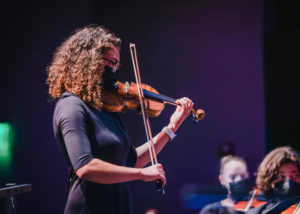
Struggles and successes
As academy music director, it is Walters’ role to audition students, place them into chamber music ensembles with other students who play at a similar level, work with the faculty coaches to assign repertoire to each group, select the repertoire and conduct each rehearsal and concert.
“But the very rewarding part,” she says, “is seeing students make progress on their instruments, learn new skills, and expand their knowledge of the artform. Because the summer academy is so intense — six hours of music making a day for 21 straight days — students make progress every single day, sometimes making as much progress in three weeks as they would in an entire semester. It is incredible to see students struggling with something on a Monday and conquering the very same challenge on Tuesday.”
Hester finds that while many students are initially “apprehensive, because they only see the busy schedule planned and the amount of music that has been set as a goal for them to learn and perform in front of an audience,” that changes as the academy progresses, with friendships and musical collaborations formed and strengthened.
“They experience the shared success of creating beautiful music,” he says. “They also experience the camaraderie of that shared understanding and creative process with their fellow musicians. Everyone works hard and frequently goes home tired at the end of the day, but it’s that kind of work and fatigue that leaves one smiling, wishing perhaps that all of life’s work could be as pleasant.”
“A different dynamic”
That includes Sophia Holdorf, home-schooled much of her life and a violinist since she was 5. Currently she is pursuing a degree in music education at The Masters University in Santa Clarita.
“I found myself a lot more energized playing with people from a variety of ages and backgrounds,” she says. “I found it helpful to feed off others, a different dynamic involved than doing solo work. Schwab was the most intensive orchestral experience I’ve had, and it was phenomenal. Yeah, there were tears on Monday, but by Tuesday we’d get it together and wonder why we struggled so much.”
Holdorf, who has participated in other music camps and programs including Santa Barbara’s Westmont Academy and the Chloé Trevor Academy in Texas, admits she underestimated the quality of music, musicians and teachers that are involved in the Schwab Academy.
“The faculty is really outstanding,” she affirms. “And Ashley Walters is just an incredible musician and woman. She has a deep insight and passion for modern music, and a clear vision of what she wants for her students. She gave wonderful guidance and direction to us.”
Holdorf also served as concertmaster for orchestral performances. “I grew a lot in my leadership and ensemble skills, and I learned a lot about humility,” she notes, smiling. “Having actual professional musicians fill in behind me for orchestral performances, people who could suggest even little things like fingering and phrasing, as well as help me decide and communicate, was so important and helpful in my growth as a musician.”
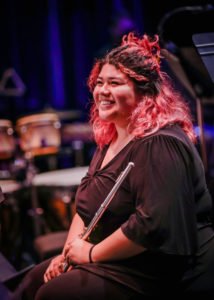
Everyone learns
Although she did not participate in this year’s academy, Liang — now an 18-year-old human biology major at University of California, San Diego — made sure to tune into the livestream performances of the violin/viola competition and the orchestra.
“I still felt connected to VC’s music even though I wasn’t actively part of making it,” she says. “And the things I learned at the Schwab Academy have translated into the non-musical aspects of my life. Discussing how to phrase notes, for example, practice communicating effectively with the people I work closely with, and figuring out bowings and fingerings exercised problem solving and analytical thinking. I believe the Schwab Academy has overall made me a well-rounded musician, student and person as it drew me closer to my peers and to violin.”
The Schwab Academy faculty, all noted professional musicians in their own right, find that they often learn from their students, who enter the academy at different levels of skill. Some may not absorb the music or techniques as quickly as others, for example, and yet such challenges are not insurmountable.
“The pace at which the academy moves makes me recognize that people can learn things very quickly,” says Akdag, who filled in the fifth (bassoon) slot in the woodwind quintet sessions he taught. “In the college semester, things are spread out too much because there’s a lot of time to learn. But by recognizing students’ capability for quick learning, you can increase the turnover rate in how much you’re able to teach, and keep the pace going. That energy from the summer carries over into the new school year.”
“And we as teachers also learn from each other,” adds Hester. “Someone is always coming up with an innovative way of teaching a difficult concept and the camaraderie we experience among each other is very similar to the students.”
Such camaraderie, participants agree, is perhaps the best feature of the academy.
“Our academy has students that range in age from 11 to 83,” says Walters, “and the community aspect, in addition to the great music, is one of the things that keeps our musicians involved in our ensembles for many years.”
“It’s great to have the mix of younger and older students,” adds Akdag. “These are people who are really into music, some of whom have been playing their entire lives and are still wanting to learn.”
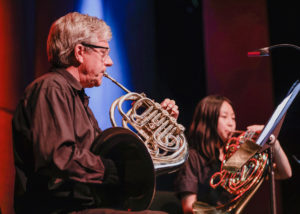
The future
As the Schwab Academy moves forward, Lawson hopes to expand the program by providing “more advanced levels” for middle school, high school and college students, as well as more beginning student ensemble courses. While the academy has initially targeted students in Ventura and Santa Barbara counties, he hopes to develop and expand enrollment throughout the state, as well as offer an “artist in residence” component, a week where an international ensemble visits, performs, presents master classes, and works with students.
“I would also like to have internationally known guest conductors work with our orchestra,” he says, adding that he wants Ventura College to be “one of the nation’s major music schools, enriching our community through the college.”
In addition to program expansion, music director Walters plans to continue to program “exciting repertoire” and above all maintain its accessibility and affordability.
“My goal is to support each and every musician that walks into our rehearsals,” she says. “Most music festivals today are prohibitive for many students, but thanks to the generous support of Miriam Schwab, our festival costs less than $200 for the three weeks and students receive college credit for enrolling. I hope to see our numbers grow and for this program to be an important part of the musical landscape for the musicians of Ventura and beyond.”
For more information on the Miriam and Henry Schwab
Academy of Music, contact the Ventura College Admissions Office, 805.289.6457, or visit www.venturacollege.edu/departments/academic/music/schwab-academy-of-music.
A Competition to Celebrate
The 2022 Schwab Summer Academy concluded on July 23-24 with the 12th Annual Henry Schwab Violin/Viola Competition, in which the talented young soloists were accompanied by the Schwab Summer Symphony Orchestra, composed of many of the academy’s students and teachers.
The competition winners:
—CATEGORY A: Skyler Lee (first place), Zephan Bornfreund (second), Bryan Huang (third).
—CATEGORY B: William Chen (first), Kyler Chu (second), Karl Baumgartner (third).
The competition was judged by Andrew McIntosh and Martin Chalifour, Concertmaster of the Los Angeles Philharmonic. John Hester, academy event coordinator and string bass instructor, served as master of ceremonies and listened to each soloist perform with the Academy Orchestra.
“I was amazed at the level of beauty and detail at which the orchestra performed,” says Hester. “I honestly could not tell the difference between the performance that I was hearing and that of a professional, regional level orchestra somewhere in Los Angeles. This was a direct result of the incredible leadership and work of our amazing conductor and music director, Ashley Walters.”



